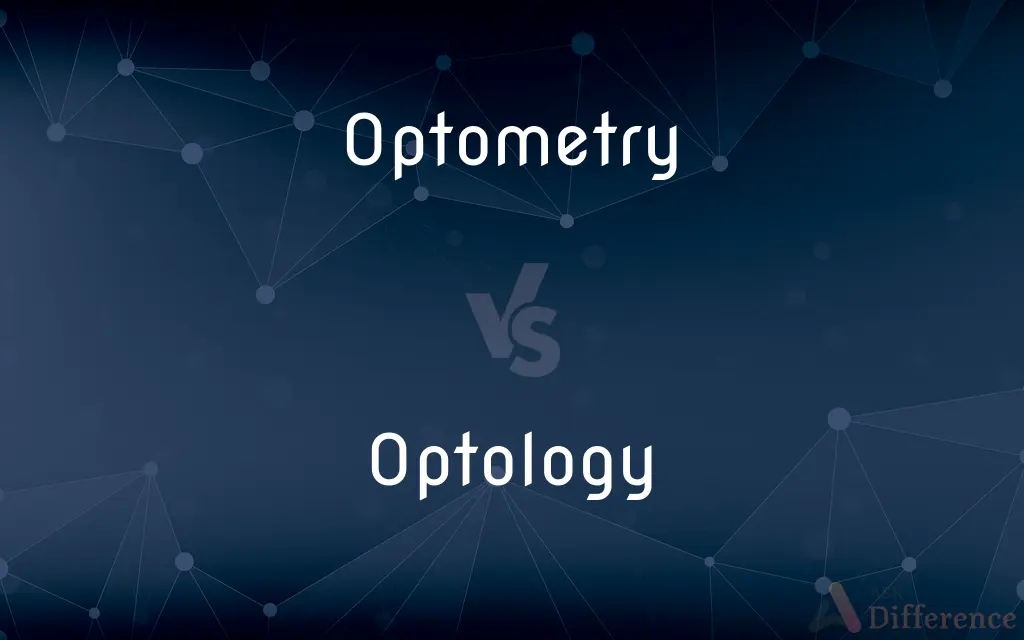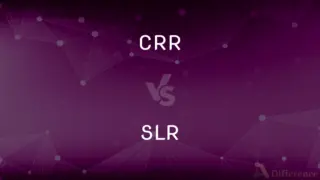Optometry vs. Optology — What's the Difference?
By Tayyaba Rehman — Published on January 3, 2024
Optometry is the healthcare profession concerned with the eyes, including vision testing and correction with glasses or contacts. Optology is not a recognized field; you may mean Ophthalmology, which is the branch of medicine involving the study.

Difference Between Optometry and Optology
Table of Contents
ADVERTISEMENT
Key Differences
Optometry is a licensed health care profession that involves examining the eyes and applicable visual systems for defects or abnormalities as well as the medical diagnosis and management of eye disease. Optometry professionals, known as optometrists, are trained to prescribe and fit lenses to improve vision, and in some countries, they can also diagnose and treat various eye diseases. Optology, as an assumed term, would theoretically refer to the study of the eye and vision, but it is not officially recognized as a professional practice or academic field.
Optometrists are primary healthcare specialists trained to examine the eyes to detect defects in vision, signs of injury, ocular diseases, or abnormality and problems with general health. They prescribe glasses, contact lenses, and provide treatments such as vision therapy or low-vision rehabilitation. Optology, lacking an official standing, implies a more general and undefined study of the eye, potentially covering various aspects of eye function and vision science without the clinical aspect of patient care.
In terms of educational requirements, optometry is a regulated profession requiring a Doctor of Optometry (OD) degree in the United States, and licensing exams must be passed to practice. Optometry includes extensive clinical training as part of the education program. In contrast, since optology is not officially recognized, there are no formal educational programs or degrees, nor is there any licensure associated with it.
Optometry involves several subspecialties, including pediatric optometry, geriatric optometry, and ocular disease, among others. Optometrists often work in conjunction with other health care professionals to provide comprehensive health care. On the other hand, optology, not being a structured discipline, does not have defined subspecialties or recognized professional collaboration.
When discussing eye care services, optometry is the term to reference for professional services related to eye exams, prescriptions for corrective lenses, and eye health management. There is no service referred to as optology, as it is not an established field within the eye care industry or the medical community.
ADVERTISEMENT
Comparison Chart
Definition
The practice or profession of examining the eyes for visual defects and prescribing corrective lenses.
A non-standard and undefined study of the eye and vision.
Professional Recognition
Recognized and regulated healthcare profession.
Not recognized as a standard academic or professional field.
Educational Requirement
Requires a Doctor of Optometry degree and licensure.
No formal educational requirements or licensure.
Clinical Practice
Includes direct patient care, prescribing lenses, and treating eye diseases.
Does not involve patient care or clinical services.
Subspecialties
Has established subspecialties in eye care.
Lacks defined subspecialties due to its non-standard nature.
Compare with Definitions
Optometry
The practice of examining eyes for vision correction.
I have an optometry appointment to get my vision checked.
Optology
The hypothetical study of vision and the eye.
He is interested in optology as a field of research.
Optometry
The healthcare profession focused on eye health.
Optometry clinics often offer screenings for eye diseases.
Optology
A non-clinical interest in optical systems.
Optology covers the physics behind how we perceive light and color.
Optometry
A field for prescribing glasses and contact lenses.
He studied optometry to help people see better.
Optology
The assumed analysis of eye function and health.
Optology might encompass alternative approaches to eye care.
Optometry
A branch of medicine that deals with the diagnosis and treatment of eye disorders.
Optometry encompasses both vision services and medical eye care.
Optology
An informal exploration of visual phenomena.
Optology may include studying the effects of light on mood.
Optometry
The industry related to optical prescriptions and treatments.
Optometry has advanced with technology, offering better solutions for vision problems.
Optology
A theoretical framework for understanding vision.
Her book on optology breaks down complex ideas about sight.
Optometry
Optometry is a health care profession that involves examining the eyes and applicable visual systems for defects or abnormalities as well as prescribing the correction of refractive error with glasses or contact lenses and the treatment of eye diseases. Traditionally, the field of optometry began with the primary focus of correcting refractive error through the use of spectacles.
Optology
(rare) The study of sight.
Optometry
The practice or profession of an optometrist.
Optometry
The art and science of vision and eye care.
Optometry
Measurement of the range of vision, esp. by means of the optometer.
Optometry
As defined (with minor variations) in the statutes of various States of the United States:
Optometry
The practice of an optometrist
Common Curiosities
How long does it take to become an optometrist?
It typically requires four years of postgraduate education to earn a Doctor of Optometry degree.
Are optometrists able to perform surgery?
In some jurisdictions, optometrists can perform minor surgical procedures, but not major surgery.
What does an optometrist do?
An optometrist examines eyes, prescribes corrective lenses, and treats eye conditions.
Is optology a recognized medical practice?
No, optology is not recognized as a standard medical or scientific practice.
Can optology provide a basis for professional healthcare?
Since it is not officially recognized, optology cannot provide a basis for professional healthcare.
Do optometrists prescribe medication?
Yes, optometrists can prescribe medications for various eye conditions.
Would optology involve direct patient care?
As a non-standard term, optology does not involve patient care.
What's the difference between optometry and ophthalmology?
Optometry focuses on vision care and correction, while ophthalmology includes comprehensive eye care and surgery.
What academic background would optology have if it were recognized?
If recognized, optology would likely involve interdisciplinary study combining optics, physiology, and neurology.
Do optometrists work in hospitals?
Optometrists can work in various settings, including hospitals, clinics, and private practices.
Is there any professional certification for optology?
No, there is no professional certification for optology as it is not an established field.
Can optometrists treat all eye diseases?
Optometrists can treat many eye diseases, but some conditions may require an ophthalmologist.
Could optology be a hobby or amateur interest?
Yes, optology could be pursued as a personal interest or hobby in the study of vision.
Is a referral needed to see an optometrist?
Generally, no referral is needed to see an optometrist for an eye exam.
Would optology be considered a science or an art?
Without official recognition, it's unclear what domain optology would fall under.
Share Your Discovery

Previous Comparison
Homogeneous Reactions vs. Heterogeneous Reactions
Next Comparison
CRR vs. SLRAuthor Spotlight
Written by
Tayyaba RehmanTayyaba Rehman is a distinguished writer, currently serving as a primary contributor to askdifference.com. As a researcher in semantics and etymology, Tayyaba's passion for the complexity of languages and their distinctions has found a perfect home on the platform. Tayyaba delves into the intricacies of language, distinguishing between commonly confused words and phrases, thereby providing clarity for readers worldwide.














































